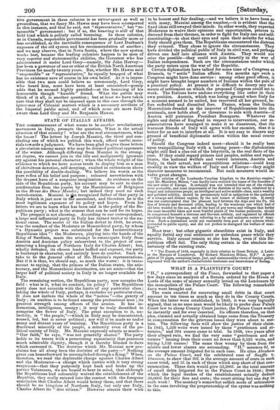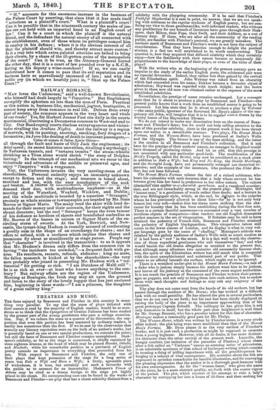WHAT IS A PLAINTIFF'S COURT?
"H.," a correspondent of the Times, forwarded to that paper a few days since an analysis of a Return ordered by the House of Lords of the sums of money annually levied on the Londoners by the monopolists of the Palace Court. The following remarkable facts were brought out.
The costs exacted for recovering small debts in that court amount to ten times as much as they do in the County Courts. When the latter were established, in 1846, it was very logically argued, that as no sane man would be likely to prefer dear Palace Court law to cheap County Court justice, the Palace Court would be instantly and for ever deserted. Its officers therefore, on that plea, claimed and actually obtained large sums from the Treasury in compensation for the grievous losses they were about to sus- tain. The following facts will show the justice of their claim. In 1845, 1,526 writs were issued by those "gentlemen and at- tornies," and 264 causes came to trial. In 1848, two years after their alleged ruin, we find the very same " gentlemen and at- tornies " issuing from their court no fewer than 6,535 writs, and trying 1,159 causes! The sums thus wrung by them from the middle and lower classes are astounding. " H." assumes Si. as the average amount litigated for in each case. He cites Abraham on the Palace Court, and the celebrated case of &tee V. Omnium, to show that 201. is the average amount of costs in each cause tried, and 5/. in each of those which stop short of that con- summation. These data would give 52,280/. as the total amount of small debts litigated for in the Palace Court in 1848 ; from which the legal leeches of the establishment actually deduct 50,0601. for their fees and costs ; the court sitting but one day In each week ! The monkey's somewhat selfish mode of arbitration in the case involving the proprietorship of the oyster was nothing to this.
ic H." accounts for this enormous increase in the business of the Palace Court by asserting, that since 1846 it has made itself "notorious as a plaintiff's court." What is a plaintiff's court? Can it be possible that in the nineteenth century the scales of jus- tice are not held with an impartial hand in an English court of law ? Can it be a court in which the plaintiff is the natural friend, and the defendant the natural enemy of all connected with the establishment, even of those whom its privileges compel him to employ in his defence ; where it is the obvious interest of all that the plaintiff should win, and thereby attract more custom ? Is it a trap into which extra-palatial attornies are bribed to bring their clients, by a share of the ill-gotten gains of the monopolists of the court? Can it be true, as the Attorney-General hinted the other day, that it is a court of law presided over by a K.C.B., having as his deputy a wine-merchant? If so, we can easily understand how it comes to pass that its evil reputation and its business have so marvellously increased of late ; and why the public cry (in which we heartily join) is, " Shut up the Palace Court!"



























 Previous page
Previous page